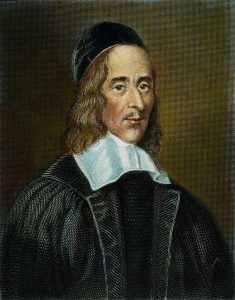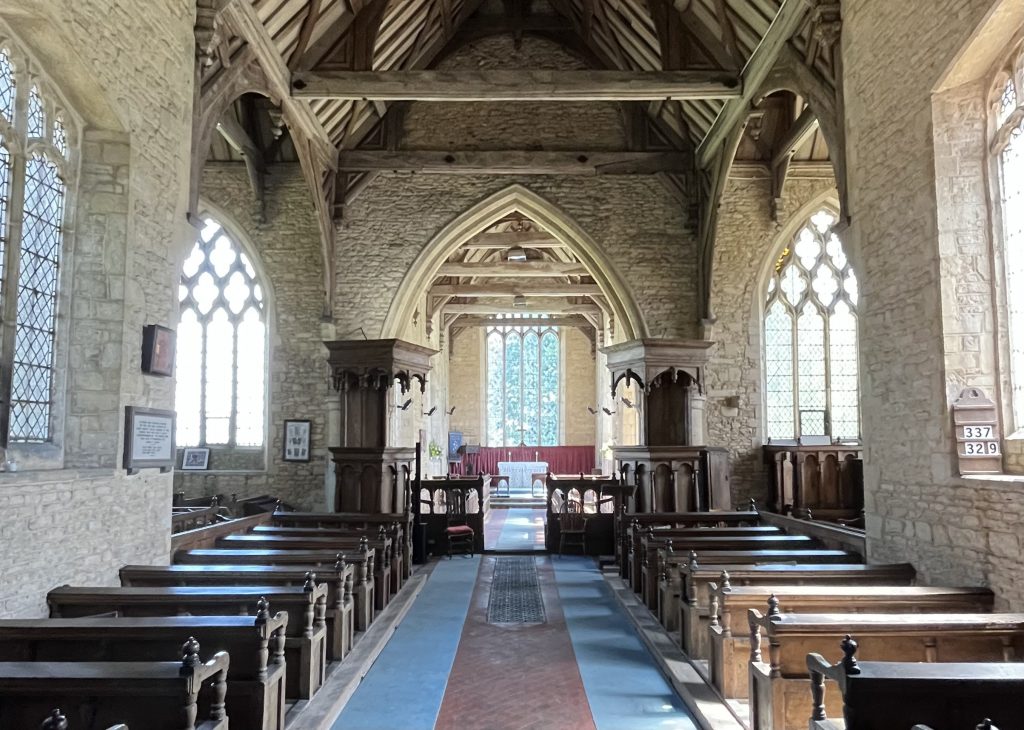 One of Nicholas Ferrar’s friends was the renowned priest and poet George Herbert. The two probably met as students at Cambridge University and remained lifelong friends, mostly if not entirely by correspondence. On his deathbed Herbert sent his poems to Nicholas who ensured their publication. The friendship between Ferrar and Herbert is commemorated at the Little Gidding Pilgrimage each year.
One of Nicholas Ferrar’s friends was the renowned priest and poet George Herbert. The two probably met as students at Cambridge University and remained lifelong friends, mostly if not entirely by correspondence. On his deathbed Herbert sent his poems to Nicholas who ensured their publication. The friendship between Ferrar and Herbert is commemorated at the Little Gidding Pilgrimage each year.
George Herbert and Nicholas Ferrar were almost exact contemporaries. Herbert was born on 3 April 1593, just a year after Ferrar, and died on 1 March 1633, four years before his friend. Herbert was born into an aristocratic family in Montgomery in Wales, close to the English border. Educated at Westminster School, and then at Trinity College, Cambridge, he became the university’s Orator, responsible for writing and declaiming Latin verse to celebrate university occasions and the visits of important people. He remained orator until 1627.
Leighton Bromswold
After the death of King James I in 1625, Herbert abandoned his hope of a position at court or in parliament, and turned to the Church. He was ordained deacon in 1626 and made prebendary of Leighton Bromswold, which lies some four miles south of Little Gidding. Although the prebend was a source of income, it involved no particular responsibility for Leighton Bromswold. When, however, he discovered that the church there was in a state of considerable disrepair, Herbert set about raising funds from his wealthy friends for a complete restoration of the building.

by George Herbert and Nicholas and John Ferrar
He proposed to resign the prebend in favour of Nicholas, but his friend declined and instead Herbert asked him with his brother John Ferrar to supervise the work. The result can largely still be seen in today’s church at Leighton, together with sympathetic 19th-century work, much of which is hard to distinguish from that of the 17th century on casual inspection. The structure of the building, cruciform and aisle-less, we owe to Herbert and the Ferrars. Many of the stalls and pews are original and the others are careful copies. The twin pulpits, giving the reading of the Prayer Book liturgy equal prominence with preaching, remain with their testers or sounding boards. The style of the woodwork is very similar to that at Little Gidding church, though of a better quality, and expert examination suggests that the same craftsmen may have been responsible.
Bemerton
Herbert was ordained priest in 1629 and his relative, the Earl of Pembroke, suggested to King Charles I that he present him to the living of Bemerton, just outside Salisbury. Never a strong figure physically, Herbert died only a few years later, on 1 March 1633. On his deathbed he dispatched the manuscripts of a great body of his English poetry to Little Gidding, telling Nicholas to publish the poems if he thought they might “turn to the advantage of any dejected poor soul”, but otherwise to burn them. Ferrar immediately arranged for the printing and publication of the poems at Cambridge, and they have been in print ever since.
The connection of George Herbert and Leighton Bromswold with Nicholas Ferrar and Little Gidding is commemorated each year at the Little Gidding Pilgrimage. This begins with a celebration of the Eucharist at Leighton followed by a five-mile walk through the gently-rolling Huntingdonshire countryside to Nicholas Ferrar’s tomb at Little Gidding for Evensong, and several of Herbert’s poems, well-known as hymns, are sung at the two services.
The Temple
The preface to the first edition of The Temple is thought to have been written by Nicholas Ferrar, and alludes to the restoration of Leighton Bromswold church.
The Printers to the Reader
The dedication of this work having been made by the Authour to the Divine Majestie onely, how should we now presume to interest any mortall man in the patronage of it? Much lesse think we it meet to seek the recommendation of the Muses, for that which himself was confident to have been inspired by a diviner breath than flows from Helicon. The world therefore shall receive it in that naked simplicitie, with which he left it, without any addition either of support or ornament, more then is included in it self. We leave it free and unforestalled to every man’s judgement, and to the benefit that he shall finde by perusall. Onely for the clearing of some passages, we have thought it not unfit to make the common Reader privie to some few particularities of the condition and disposition of the Person;
Being nobly born, and as eminently endued with gifts of the minde, and having by Industrie and happy education perfected them to that great height of excellencie, whereof his fellowship of Trinitie Colledge in Cambridge, and his Orator-ship in the Universitie, together with that knowledge which the King’s Court had taken of him, could make relation farre above ordinarie. Quitting both his deserts and all the opportunities that he had for worldly preferment, he betook himself to the Sanctuarie and Temple of God, choosing rather to serve at God’s Altar, then to seek the honour of State-employments. As for those inward enforcements to this course (for outward there was none) which many of these ensuing verses bear witness of, they detract not from the freedome, but adde to the honour of this resolution in him. As God had enabled him, so he accounted him meet not onely to be called, but to be compelled to this service: Wherein his faithful discharge was such, as may make him justly a companion to the primitive Saints, and a pattern or more for the age he lived in.
To testifie his independencie upon all others, and to quicken his diligence in this kinde, he used in his ordinarie speech, when he made mention of the blessed name of our Lord and Saviour Jesus Christ, to adde, My Master.
Next God, he loved that which God himself hath magnified above all things, that is, his Word: so as he hath been heard to make solemn protestation, that he would not part with one leaf thereof for the whole world, if it were offered him in exchange.
His obedience and conformitie to the Church and the discipline thereof was singularly remarkable. Though he abounded in private devotions, yet went he every morning and evening with his familie to the Church; and by his example, exhortations, and encouragements drew the greater part of his parishioners to accompanie him dayly in the publick celebration of Divine Service.
As for worldly matters, his love and esteem to them was so little, as no man can more ambitiously seek, then he did earnestly endeavour the resignation of an Ecclesiasticall dignitie, which he was possessour of. But God permitted not the accomplishment of this desire, having ordained him his instrument for re-edifying of the Church belonging thereunto, that had layen ruinated almost twenty yeares. The reparation whereof, having been uneffectually attempted by publick collections, was in the end by his own and some few others private freewill-offerings successfully effected. With the remembrance whereof, as of an especiall good work, when a friend went about to comfort him on his deathbed, he made answer, It is a good work, if it be sprinkled with the bloud of Christ: otherwise then in this respect he could finde nothing to glorie or comfort himself with, neither in this, nor in any other thing.
And these are but a few of many that might be said, which we have chosen to premise as a glance to some parts of the ensuing book, and for an example to the Reader. We conclude all with his own Motto, with which he used to conclude all things that might seem to tend any way to his own honour:
Lesse then the least of God’s mercies.
Collect
King of glory, king of peace,
who called your servant George Herbert
from the pursuit of worldly honours
to be a priest in the temple of his God and king:
grant us also the grace to offer ourselves
with singleness of heart in humble obedience to your service;
through Jesus Christ your Son our Lord.
Amen.
Collect from: Common Worship: Services and Prayers for the Church of England,
© the Archbishops’ Council of the Church of England 2000.
